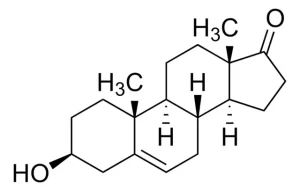
Dehydroepiandrosterone, commonly referred to as DHEA, is a hormone produced naturally by the adrenal glands. It serves as a precursor to both testosterone and estrogen, playing a vital role in various physiological processes. As individuals age, the production of DHEA declines significantly, leading many to explore supplementation as a means to counteract the effects of aging and enhance overall health and fitness. The positive outlook surrounding DHEA stems from its potential benefits in muscle growth, fat loss, and improved well-being, making it a compelling option for those seeking to optimize their physical performance and health.
From a fitness perspective, DHEA has garnered attention for its potential to enhance muscle mass and strength. As a natural steroid hormone, DHEA may help increase testosterone levels in the body, which can lead to improved muscle growth and performance. For individuals engaged in resistance training or high-intensity workouts, supplementing with DHEA could provide an additional boost to their training efforts. Research suggests that when combined with regular exercise, DHEA supplementation may enhance the effects of weight training on muscle mass and strength, particularly in older adults who experience age-related declines in these areas.
The relationship between DHEA and muscle growth is particularly relevant for those looking to combat sarcopenia, the gradual loss of muscle mass that occurs with aging. By potentially increasing lean body mass and improving strength, DHEA supplementation could help older individuals maintain their physical function and independence as they age. This aspect of DHEA is especially encouraging for seniors who wish to remain active and healthy, as maintaining muscle mass is crucial for overall mobility and quality of life.
In addition to its effects on muscle growth, DHEA may also play a role in fat metabolism. Some studies suggest that DHEA supplementation can aid in reducing body fat while preserving lean muscle mass. This dual benefit is particularly appealing for individuals aiming to improve their body composition without sacrificing strength or performance. By promoting fat loss while supporting muscle retention, DHEA can be an effective tool in achieving fitness goals related to weight management.
Beyond its physical benefits, DHEA has been associated with improvements in mood and overall well-being. Many individuals report feeling more energetic and mentally sharp when taking DHEA supplements. This enhancement in mental clarity and mood can be particularly beneficial for those engaged in demanding training regimens or competitive sports where focus and mental resilience are essential. The potential for DHEA to positively influence mood is an important consideration for athletes who must navigate the psychological demands of rigorous training and competition.
DHEA’s role in supporting bone health is another positive aspect worth mentioning. As individuals age, bone density tends to decline, increasing the risk of fractures and osteoporosis. Some research indicates that DHEA supplementation may help improve bone mineral density, providing an additional layer of protection against age-related bone loss. This benefit is particularly significant for women post-menopause, who are at greater risk for osteoporosis due to hormonal changes. By promoting bone health alongside muscle growth and fat loss, DHEA presents a holistic approach to aging gracefully.
For those considering DHEA supplementation, it is essential to approach it with informed caution. While many people experience positive effects from taking DHEA, individual responses can vary widely based on factors such as age, sex, and overall health status. Consulting with a healthcare professional before starting any supplementation regimen is advisable to ensure that it aligns with personal health goals and needs.
The safety profile of DHEA is generally favorable when used appropriately; however, potential side effects can occur. These may include hormonal imbalances leading to acne, hair loss, or changes in menstrual cycles for women. Monitoring hormone levels during supplementation can help mitigate these risks and ensure that individuals achieve the desired benefits without adverse effects.
In conclusion, dehydroepiandrosterone (DHEA) emerges as a promising supplement within the fitness and health landscape. Its potential benefits in enhancing muscle growth, supporting fat loss, improving mood, and promoting bone health make it an attractive option for individuals seeking to optimize their physical performance and overall well-being. While more research is needed to fully understand the extent of its effects across different populations, the current evidence suggests that DHEA can play a significant role in helping individuals achieve their fitness goals.
As society continues to emphasize healthy aging and active lifestyles, DHEA stands out as a natural ally for those looking to maintain their vitality into later years. With responsible use under professional guidance, this hormone could contribute positively not only to physical performance but also to overall quality of life. The journey toward optimal health is multifaceted; incorporating supplements like DHEA may be one valuable piece of the puzzle for achieving long-term wellness and fitness success.
Need your own dietary supplement manufacturer? Extremely competitive rates. We produce it all. Talk to us.
Comments are closed